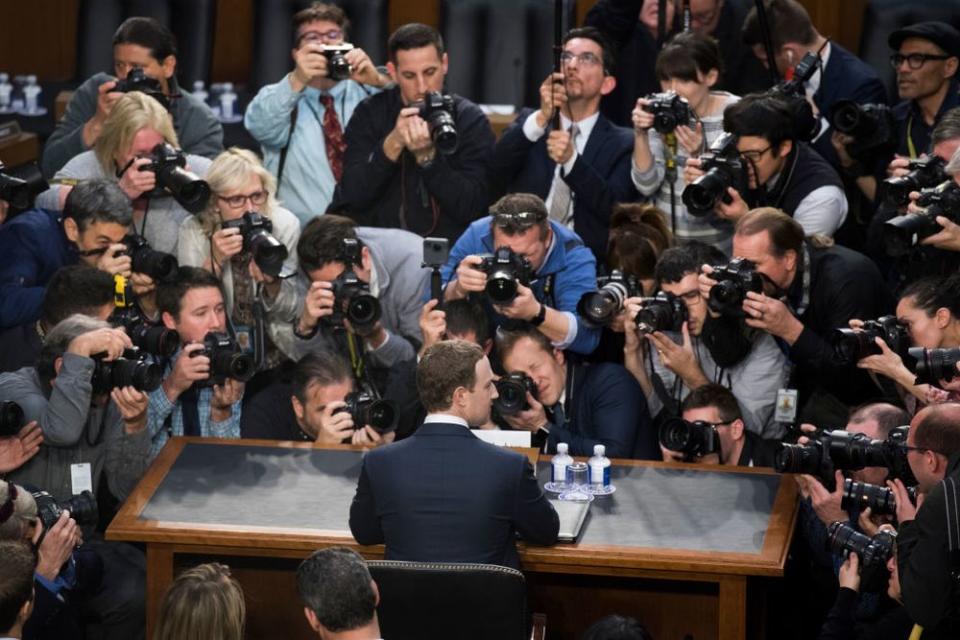Mark Zuckerberg Has Made the Case Against a Fragmented Internet. Here's the Case for It.
Facebook is stepping up its mission to get regulated—words that would have read as absurd a year ago, but no longer, thanks to recent events such as the Cambridge Analytica scandal and the introduction of the EU’s General Data Protection Regulation (GDPR).
CEO Mark Zuckerberg wrote in a Saturday Washington Post op-ed that “we need new regulation in four areas: harmful content, election integrity, privacy and data portability.”
That’s a huge shift. Go back a few years and Facebook was still trying to ward off German hate-speech regulation by insisting that its own community moderation systems were sufficient (Facebook’s effort failed,) and quietly lobbying against the “overly restrictive” GDPR (ditto.) Now Zuckerberg is saying things like “Internet companies should be accountable for enforcing standards on harmful content,” and “I believe it would be good for the Internet if more countries adopted regulation such as GDPR as a common framework.”
Facebook has clearly now realized that regulation is inevitable. Its problem is that regulation, coming as it does from a variety of countries and even individual states, is also fragmented. That makes life complicated and unpredictable, so the company is pushing for international standardization of rules.
‘An ever-more Balkanized Internet’
“Global leaders need to grapple with these ideas,” Facebook’s chief lobbyist, the former British politician Nick Clegg, told Politico. “If not, we will get an ever-more Balkanized Internet.”
“A common global framework–rather than regulation that varies significantly by country and state–will ensure that the Internet does not get fractured, entrepreneurs can build products that serve everyone, and everyone gets the same protections,” wrote Zuckerberg in his op-ed.

Facebook makes a strong case for unified global regulation. It would be great if everyone knew what rules to expect, and if businesses did not have to spend so many resources addressing the desires of disparate regulators. However, the case against the idea is strong too, particularly when it comes to issues such as privacy and censorship.
The GDPR example
Let’s take the GDPR as an example.
The EU law is the most impressive privacy-legislation model out there, in terms of being up-to-date with the privacy challenges presented by modern technology, and (hopefully) being flexible enough to deal with the evolution of those challenges. Other countries would do well to take inspiration from it as they legislate to protect their own citizens’ privacy rights. But the GDPR also includes the right to be forgotten, which heavily clashes with U.S. free-speech protections.
The right to be forgotten gives people the ability to demand that information about them be deleted or delisted if it is “inaccurate, inadequate, irrelevant or excessive.” The First Amendment would make it impossible to introduce such legislation in the U.S. The EU and U.S. both provide citizens with free-speech and privacy rights, but when balancing those rights the former gives more weight to privacy and the latter to free speech. You can’t harmonize those systems without one side giving way.
The same goes for the Europe’s government-led approach to removing hate speech as quickly as possible, as Federal Communications Commissioner Brendan Carr made abundantly clear in a tweet responding to Zuckerberg’s article.
Facebook says it’s taking heat for the mistakes it makes in moderating content. So it calls for the government to police your speech for it.
Outsourcing censorship to the government is not just a bad idea, it would violate the First Amendment.
I’m a no.https://t.co/1q5k1OxS42— Brendan Carr (@BrendanCarrFCC) March 31, 2019
There’s also the minor issue of the U.S. and EU not constituting the world. Some countries, such as China and Russia, take an approach to online regulation that is less than desirable.
Russia, for example, introduced its own “right to be forgotten” law a few years back, but it added an unpleasant twist: while the EU version contains a strong exception for information that is in the public interest or that relates to public figures who should have a limited expectation of privacy, there is no such carve-out in the Russian law. That means public figures there can order the suppression of information about them that people should really know about.
Which version of that law should become the international standard? To Western eyes, the obvious answer is either “none” or “the European version,” but that wouldn’t fly with the Kremlin. Russia will just keep on doing what it does: blocking and censoring away.
Fragmentation’s not all bad
Facebook’s call for a regulatory rethink deserves to be heard and deeply considered. Zuckerberg makes a particularly good point when he admits Facebook “shouldn’t make so many important decisions about speech on [its] own.” But no matter how desirable common rules might be, the fact is that Internet fragmentation is here to stay. And, in some respects, this may not be a bad thing.
Yes, it would be ideal if China hadn’t effectively created its own, separable Internet by erecting its Great Firewall, and if Russia and Iran weren’t trying to do the same. Internet idealism holds that the network of networks should bring the world together. But, while the Internet naturally ignores borders on a technical level, governments also naturally want to impose their own rules and norms within their own physical borders. That’s not a bad thing: it’s the basis of the modern state.
We’re never going to get a framework that pleases everyone. The best we can hope for is some sort of consensus between countries that err on the side of freedom. Even that would involve compromises that might prove too unpalatable—but perhaps it is worth trying nonetheless.

